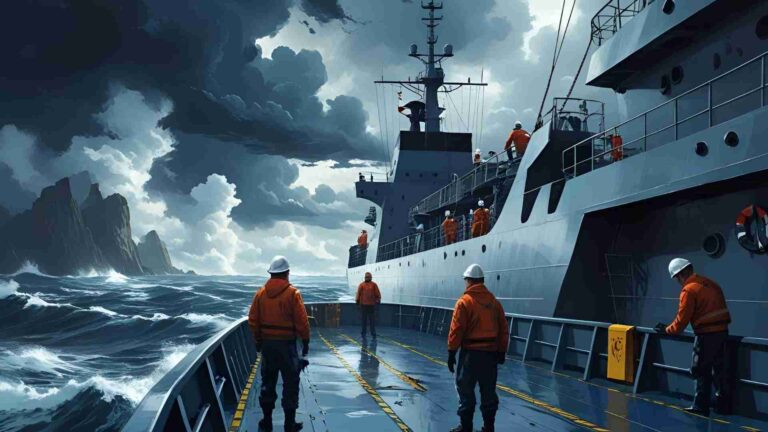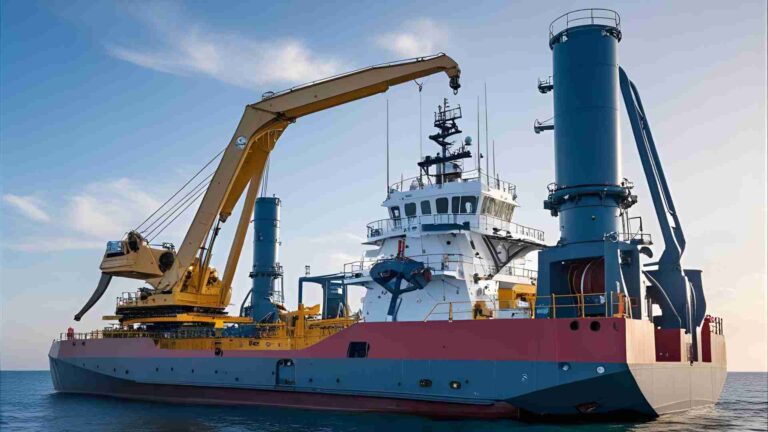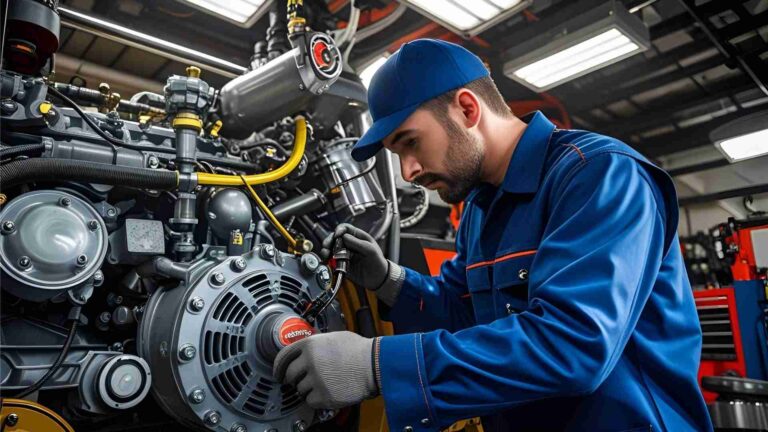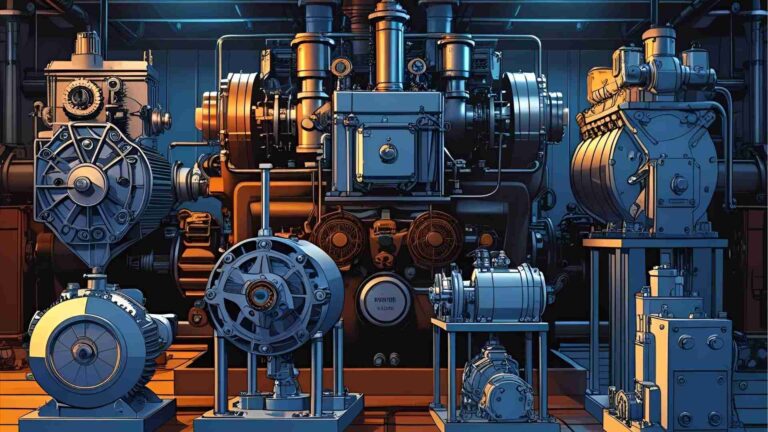Ship Surveying
The maritime industry forms the backbone of global trade, transporting over 80% of the world’s goods by volume. At the heart of this vast ecosystem lies ship surveying, a critical process that ensures vessels and marine structures operate safely, efficiently, and in compliance with stringent regulations. Ship surveying involves meticulous inspections of a vessel’s structure, machinery, and systems, coupled with quality assurance practices to maintain high standards. This article delves into the intricacies of ship surveying, the role of classification societies, the Continuous Survey of Machinery (CSM), and the qualifications and responsibilities of marine surveyors. Through detailed analysis, charts, and practical insights, we explore how this profession safeguards the maritime world.
What is Ship Surveying?
Ship surveying is the systematic evaluation of a vessel’s condition to ensure it meets safety, environmental, and regulatory standards. Conducted by marine surveyors—specialized professionals with expertise in maritime engineering, naval architecture, and regulations—this process involves inspecting a ship’s hull, machinery, electrical systems, navigation equipment, and safety mechanisms. Surveyors also review documentation, such as certificates, logbooks, and manuals, to verify compliance with international and national standards.
The primary objectives of ship surveying are:
- Safety: Ensuring vessels are seaworthy and pose no risk to crew, passengers, or the environment.
- Compliance: Verifying adherence to regulations set by bodies like the International Maritime Organization (IMO) and classification societies.
- Performance: Assessing the operational efficiency of machinery and systems to minimize downtime and optimize functionality.
- Risk Mitigation: Identifying potential issues to prevent accidents, environmental damage, and financial losses.
Ship surveying is not a one-time event but a continuous process that spans a vessel’s lifecycle—from construction to decommissioning. It encompasses various types of surveys, including initial, annual, intermediate, and special surveys, each tailored to specific stages or requirements.
The Role of Quality Assurance in Ship Surveying
Quality assurance (QA) is integral to ship surveying, ensuring that inspections are conducted consistently and reliably. QA involves:
- Standardized Procedures: Developing and adhering to standard operating procedures (SOPs) for surveys.
- Training and Evaluation: Providing regular training for surveyors and evaluating their performance to maintain competence.
- Record-Keeping: Maintaining accurate and detailed records of inspections, findings, and recommendations.
- Continuous Improvement: Incorporating feedback and technological advancements to enhance survey accuracy and efficiency.
Effective QA minimizes errors, ensures impartiality, and builds trust among stakeholders, including shipowners, operators, insurers, and regulatory bodies. By upholding high standards, QA contributes to safer seas and reduced liability risks.
Continuous Survey of Machinery (CSM): A Pillar of Vessel Maintenance
The Continuous Survey of Machinery (CSM) is a specialized inspection process focused on a vessel’s machinery, ensuring its safe and efficient operation throughout its lifespan. Unlike one-off surveys, CSM is conducted over a five-year cycle, allowing for staggered inspections of machinery components to reduce operational disruptions.
How CSM Works
CSM involves regular inspections of critical machinery, including:
- Main Engines: Assessing performance, wear, and maintenance records.
- Generators: Checking electrical output and condition.
- Boilers: Inspecting for corrosion, leaks, and pressure integrity.
- Auxiliary Equipment: Evaluating pumps, compressors, and other systems.
Marine surveyors or qualified engineers conduct these inspections, looking for signs of wear, corrosion, or damage. They also verify that maintenance aligns with manufacturer guidelines and that the crew is adequately trained to operate and maintain the equipment.
Classification societies, such as Lloyd’s Register (LR), American Bureau of Shipping (ABS), DNV-GL, and Bureau Veritas (BV), mandate CSM for machinery under their rules. To streamline the process, societies allow some components to be surveyed in rotation over the five-year cycle. Additionally, Chief Engineers can perform certain surveys under supervision, with classification surveyors auditing and crediting these inspections during annual audits.
Benefits of CSM
The CSM offers several advantages:
- Early Problem Detection: Identifies issues before they escalate, preventing costly breakdowns.
- Reduced Downtime: Staggered surveys minimize operational interruptions.
- Compliance: Ensures adherence to regulations like the International Safety Management (ISM) Code.
- Cost Efficiency: Aligning maintenance and survey schedules optimizes resources.
To illustrate the CSM cycle, consider the following table:
| Year | Machinery Component | Survey Type | Responsible Party |
|---|---|---|---|
| Year 1 | Main Engines | Full Inspection | Classification Surveyor |
| Year 2 | Generators | Partial Survey | Chief Engineer |
| Year 3 | Boilers | Full Inspection | Classification Surveyor |
| Year 4 | Auxiliary Equipment | Partial Survey | Chief Engineer |
| Year 5 | All Components | Comprehensive Audit | Classification Surveyor |
This structured approach ensures all machinery is thoroughly evaluated over the cycle, maintaining vessel reliability.
CSM Workflow
Below is a flowchart depicting the CSM process:
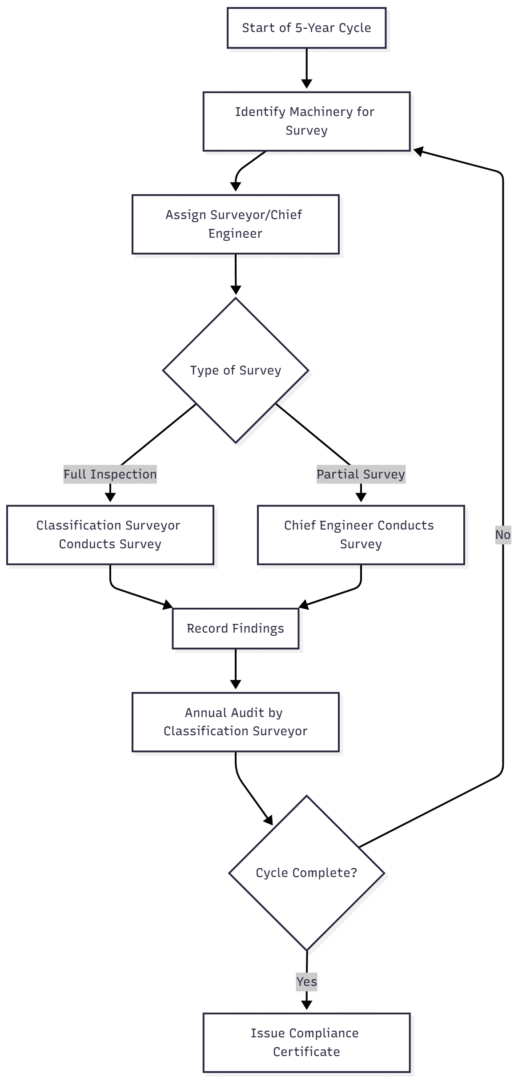
This chart illustrates the iterative nature of CSM, highlighting the collaboration between surveyors and engineers.
Ship Classification Societies: Guardians of Maritime Standards
Classification societies are organizations that establish technical standards for the design, construction, and maintenance of ships and offshore structures. They play a pivotal role in ensuring vessels are safe, environmentally compliant, and fit for purpose. Major societies include LR, ABS, DNV-GL, and BV, all members of the International Association of Classification Societies (IACS).
Role of Classification Societies
Classification societies perform the following functions:
- Standard Setting: Developing rules for vessel construction, maintenance, and operation.
- Certification: Issuing certificates of compliance based on survey outcomes.
- Inspections: Conducting surveys to verify adherence to standards.
- Technical Support: Providing guidance on design, repairs, and upgrades.
- Regulatory Liaison: Collaborating with bodies like the IMO to align standards with international regulations.
The IACS, comprising 12 major societies, promotes uniformity in standards and procedures. It works with the IMO and the International Organization for Standardization (ISO) to advance maritime safety and sustainability.
Impact of Classification Societies
Classification societies ensure that vessels meet rigorous standards, reducing the risk of accidents and environmental harm. For example, a vessel certified by a reputable society is more likely to secure insurance and operate in international waters. The societies also drive innovation, developing solutions for emerging challenges like decarbonization and autonomous shipping.
Types of Marine Surveyors
Marine surveyors are a diverse group, each specializing in different aspects of maritime inspection. The main types include:
1. Government Surveyors
Government surveyors enforce national and international maritime regulations. They are divided into:
- Flag State Surveyors: Report to the vessel’s registered country, ensuring compliance with its laws.
- Port State Surveyors: Inspect foreign vessels entering a country’s ports, with authority to detain non-compliant ships.
2. Classification Surveyors
These surveyors work for classification societies, ensuring vessels meet class rules and flag state requirements. They conduct surveys during construction, operation, and maintenance, recommending corrective actions when needed.
3. Cargo Surveyors
Cargo surveyors focus on verifying the quantity and condition of cargo, particularly for bulk or grain shipments. They perform draft surveys to calculate cargo weight and assess loading safety to prevent issues like cargo shift.
4. Independent Surveyors
Independent surveyors offer services to shipowners, insurers, or brokers. They conduct condition surveys, pre-purchase surveys, and accident investigations, providing unbiased assessments for insurance claims or sales.
5. Yacht and Small Craft Surveyors
Specializing in vessels under 24 meters, these surveyors inspect recreational boats, focusing on hulls, rigs, and systems unique to pleasure craft. In the UK, they may also conduct MCA coding surveys for commercial small craft.
6. MCA Coding Surveyors
In the UK, MCA coding surveyors ensure small commercial vessels comply with Maritime and Coastguard Agency codes, issuing licenses through approved Certifying Authorities.
Qualifications and Skills of Marine Surveyors
Marine surveying is a largely unregulated profession, allowing individuals from various backgrounds to practice. However, certain qualifications and skills are essential:
- Technical Expertise: Knowledge of naval architecture, marine engineering, and maritime regulations.
- Attention to Detail: Precision in identifying defects or non-compliance.
- Problem-Solving: Ability to diagnose issues and recommend solutions.
- Communication: Explaining technical findings to non-experts.
- Professional Integrity: Maintaining impartiality, especially for independent surveyors.
Many surveyors hold credentials from organizations like the Society of Accredited Marine Surveyors (SAMS) or the International Institute of Marine Surveying (IIMS). These bodies offer training, certifications, and guidelines to ensure competence. For example, IIMS provides diploma courses in yacht, small craft, and commercial ship surveying, while the Australasian Institute of Marine Surveyors offers accredited courses meeting AMSA standards.
Surveyors often carry errors and omissions insurance to protect against potential liabilities. A historical perspective from an 1834 memorandum emphasizes the need for “talent, integrity, and firmness” in surveyors, a standard that remains relevant today.
Training and Education for Marine Surveyors
Training for marine surveyors varies, with no global licensing requirement. Common pathways include:
- Correspondence Courses: Offered by institutions like IIMS and Lloyd’s Maritime Academy.
- Apprenticeships: Learning under experienced surveyors.
- Prior Experience: Leveraging backgrounds in marine engineering, naval architecture, or ship operations.
Notable institutions include:
- IIMS: Offers diplomas in yacht, small craft, and commercial ship surveying, plus a qualification in marine corrosion.
- Suny Maritime College: Provides online courses in cargo, hull, and yacht surveying.
- Lloyd’s Maritime Academy: Offers diplomas and MSc programs in marine surveying.
- Australasian Institute of Marine Surveyors: Provides accredited courses for AMSA certification.
These programs equip surveyors with the skills to inspect diverse vessels, from mega yachts to commercial ships.
The Importance of Marine Surveyors
Marine surveyors are indispensable to the maritime industry for several reasons:
- Safety: They ensure vessels are seaworthy, protecting lives and the environment.
- Compliance: They verify adherence to regulations, avoiding legal and financial penalties.
- Insurance: Their assessments determine insurance premiums and claim validity.
- Operational Efficiency: By identifying maintenance needs, they reduce downtime and costs.
For example, a surveyor’s report can influence a vessel’s market value or insurability, impacting decisions by shipowners and insurers. In accident investigations, surveyors serve as expert witnesses, providing critical evidence in legal proceedings.
A Day in the Life of a Marine Surveyor
A marine surveyor’s day is dynamic and varied. They may start at a shipyard inspecting a new vessel’s construction, move to a port to assess a cargo ship’s load, and end with a dive to examine a hull for damage. Each task requires technical expertise, adaptability, and a keen eye for detail. Surveyors often work in challenging conditions, from confined engine rooms to open seas, making their role both demanding and rewarding.
Challenges and Future Trends
Marine surveyors face several challenges:
- Regulatory Complexity: Navigating diverse international and national regulations.
- Technological Advancements: Keeping pace with innovations like autonomous ships and green technologies.
- Environmental Pressures: Ensuring compliance with stringent environmental standards, such as IMO’s sulfur cap.
Future trends include:
- Digitalization: Use of drones, AI, and remote sensing for inspections.
- Sustainability: Focus on eco-friendly designs and fuels.
- Training Evolution: Incorporating virtual reality and online learning for surveyor education.
Frequently Asked Questions
Classification societies like LR, ABS, and DNV-GL set standards, certify vessels, and conduct surveys to ensure safety and compliance.
Ship surveying is the process of inspecting and evaluating a vessel’s condition, including its structure, machinery, and systems, to ensure compliance with safety, environmental, and regulatory standards. It is crucial for ensuring vessels are seaworthy, preventing accidents, minimizing environmental impact, and maintaining compliance with international regulations like those set by the International Maritime Organization (IMO).
Marine surveyors, often with expertise in naval architecture or marine engineering, or chief engineers under classification society supervision, conduct surveys.
The Continuous Survey of Machinery (CSM) is a five-year inspection cycle focused on a ship’s machinery, such as engines, generators, and boilers.
Conducted by marine surveyors or chief engineers, CSM ensures machinery operates safely and efficiently, identifying issues early to reduce downtime and ensure compliance with classification society rules and the International Safety Management (ISM) Code.
Surveyors need technical knowledge, attention to detail, and often certifications from bodies like IIMS or SAMS, though no global license is required.
Conclusion
Ship surveying is a cornerstone of the maritime industry, ensuring vessels operate safely, efficiently, and in compliance with regulations. Through meticulous inspections, quality assurance, and specialized processes like the Continuous Survey of Machinery, marine surveyors safeguard lives, protect the environment, and support global trade. Classification societies and professional bodies like IACS and IIMS play a vital role in standardizing practices and fostering innovation. As the industry evolves, surveyors will continue to adapt, leveraging technology and expertise to meet new challenges. The next time you see a ship gliding across the ocean, know that marine surveyors are the unsung heroes ensuring its journey is safe and sound.
Happy Boating!
Share Ship Surveying with your friends and leave a comment below with your thoughts.
Read 50 Questions and Answers Asked in Oral Exam for Marine Third Engineer Officers until we meet in the next article.


